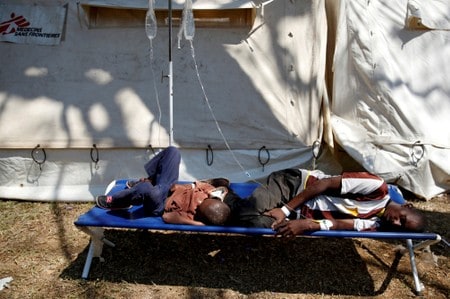By MacDonald Dzirutwe
HARARE (Reuters) – The World Health Organization and the Red Cross said on Thursday they were ramping up their emergency responses to Zimbabwe’s deadliest cholera outbreak in a decade, with politicians trading blame over contaminated water and collapsing infrastructure.
The death toll rose to 26 from the disease, testing the capacity of a new government to handle a major crisis just weeks after violent demonstrations that followed the first election since Robert Mugabe was toppled in a coup.
The opposition controls the city government in the capital, and exchanged blame with the ruling ZANU-PF party of President Emmerson Mnangagwa.
The World Health Organization (WHO) said it was providing kits that contain oral rehydration solution, intravenous fluids and antibiotics as the outbreak expanded quickly in Harare.
The International Red Cross in Zimbabwe said it had deployed more than 1,000 volunteers to contain the outbreak. Residents in Harare were dealing with a “double punch” after a recent outbreak of typhoid.
“It’s so painful to lose a lot of people and we are finding it difficult to mourn them under the circumstances,” Sharon Chiwomboya, mother of a cholera patient, said outside a clinic in Glenview suburb. “We fear for our school-going kids who are also affected, as well as adults.”
Zimbabwe’s biggest university said it had postponed a graduation ceremony set for Friday due to the cholera outbreak.
Mnangagwa, who won an election in July after first taking power when Mugabe was toppled last year, faces the difficult task of rebuilding an economy that collapsed under Mugabe’s four-decade rule. Rebuilding infrastructure is hard for a government that spends 93 percent of its $4 billion annual budget on salaries.
The latest cholera outbreak hit the city of 1.5 million people after burst sewers in the Budiriro and Glenview suburbs contaminated water in boreholes used by residents. Harare’s population draws water from one lake originally meant for 300,000 people, while a new dam first mooted in the 1990s is still to be constructed due to funding problems.
“TERRIBLE CONSEQUENCE”
“The current cholera epidemic is a terrible consequence of Zimbabwe’s failure to invest in and manage both its basic water and sanitation infrastructure and its health care system,” Jessica Pwiti, Executive Director of Amnesty International Zimbabwe, said.
New Health Minister Obadiah Moyo blamed the opposition-controlled city government.
“Someone was probably sitting on their job,” he said. “This whole problem has arisen as a result of blocked sewers and these were reported and were never repaired for at least two months.”
The opposition says the central government should have provided more money. Harare city council officials have said they need up to $10 billion to repair water, sewers and roads.
In the capital, long stretches of roads have been reduced to potholed dusty tracks. Roads in other towns are in a worse state of disrepair because government services are non-existent.
Raw sewage flows daily from blocked and burst pipes and garbage piles up in some city townships. Residents in some suburbs in Harare have not had running water for years and use open wells.
Zimbabwe’s debt of $11 billion to foreign lenders like the World Bank and Africa Development Bank make it difficult to borrow to finance infrastructure development.
At the height of Zimbabwe’s economic crisis in 2008, 4,000 people died from cholera and more than 40,000 were infected.
(Editing by James Macharia and Peter Graff)


